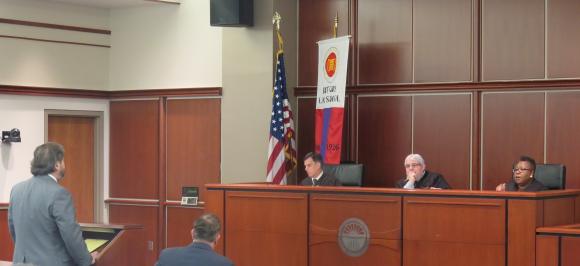
The Appellate Panel, from left to right, included Judge Harry Carroll, Judge Jose Fuentes and Judge Greta Gooden Brown.
Students at Rutgers Law School in Newark observed Appellate Court oral aguments with Judges Jose Fuentes, Harry Carroll and Greta Gooden Brown in the Baker Court Room at the Center for Law and Justice on March 1.
The judges, who hear oral arguments in Essex County, heard several cases, but the most noteworthy was the first case of the day – an appeal to examine evidence in the murder trial of Melanie McGuire. McGuire is a Woodbridge woman who was dubbed the “suitcase killer” after her husband’s remains were found in garbage bags inside two suitcases in the Chesapeake Bay in 2004.
Students and attorneys filled the Baker Court Room to observe the judges and listen to the arguments.
McGuire was convicted of her husband’s murder in 2007 and is serving a life sentence.
Michael Priarone, an attorney for McGuire, argued that her attorneys should be able to examine evidence that is in the state’s custody in an application for post-conviction relief.
He contended McGuire’s trial attorneys provided ineffective representation at her trial and argued that prior to being accused of her husband’s murder, McGuire was “a solid citizen, devoted mother and nurse” who was “well thought of in the community.”
He alleged that her previous trial attorneys should have conducted DNA testing and additional tests on evidence that included plastic garbage bags, but may not have done so because the cost to hire experts would have exceeded their retainer.
McGuire has maintained her innocence. “The state’s case was largely circumstantial,” he said. “This woman is in prison. She’s effectively buried alive.”
McGuire previously sought post-conviction relief in 2014 arguing then that she was denied effective representation by her former attorney, Joseph Tacopina. Her request was denied by former Middlesex County Superior Court Judge Bradley Ferencz.
Deputy Attorney General Daniel Bornstein argued against Piarone’s request, saying that McGuire was represented by “one of the most prominent and well-regarded” counsel in the United States. He alleged the reason the tests were not done were because they may not have come out in McGuire’s favor.
“Can we fault the defendant’s attorneys now for not taking that risk?” Bornstein asked, adding that there was overwhelming evidence against McGuire during the trial. “Were those decisions reasonable at the time? They were reasonable.”
The audience at the hearing also included members of McGuire’s family.
Judge Fuentes reminded Priarone to keep his arguments centered on whether or not McGuire had received effective counsel and not to rehash evidence in the case. “Your client had a trial, she had a conviction, she had all of the due process she was entitled to,” he said.
Priarone asked the court to allow her attorneys to examine clippings from a comb and evidence stored on a hard-drive computer, both in the state’s custody. “What is the harm,” he asked the judges. “This is a young woman who will die in prison if she doesn’t get relief.”
However, Bornstein countered that case law shows there is not a right to general discovery for post-conviction relief.
The judges heard additional cases before adjourning for the day.